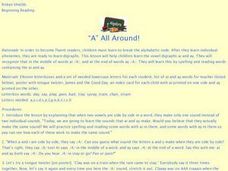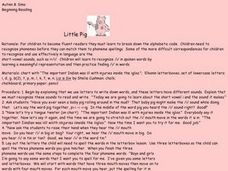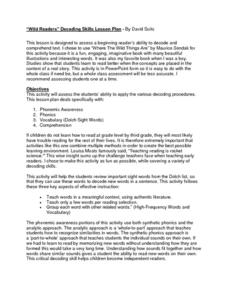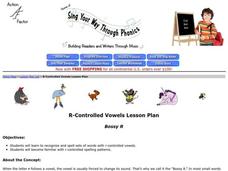Curated OER
Blast-Off to Blending
Practice working with different phonemes in consonants and vowels. Sounds are written on squares that get put on a rocket to "blast off" and meet other sounds. The teacher first models blending, then reads the new words. Young readers...
Curated OER
Amazing As
Help young readers recognize the short vowel /a/ in written and spoken language. Through matching and listening activities, they discriminate the vowel sound /a/ from other phonemes. Learners associate the phoneme with its letter...
Curated OER
Bee a Reader
Use a fun tongue twister to help your class remember the /ee/ sound! With this lesson, they distinguish between the sounds for short vowel e and long vowel e. They are introduced to the vowel patterns that comprise long vowel sounds,...
Curated OER
Beat the Heat
Review common digraphs with your early elementary schoolers. They identify the digraph /ea/ in written and spoken language. After a brief discussion, they apply the rule for identifying and spelling words containing the /ea/ digraph....
Curated OER
Iggy the Penguin
Take your young word detectives on a hunt for the /i/ sound. Use the tongue twister about Iggy the penguin to help learners identify the target sound. Then learners are given several words, and they have to use their detective skills to...
Curated OER
"A" All Around
Spell and read words containing ai and ay. First and second graders identify vowel digraphs in written and spoken language. After a brief discussion on the combinations of letters that comprise digraphs, they practice reading and...
Curated OER
Ehhhh?
Are your kindergarten learners working with the letter e and the sounds that is makes? They'll practice writing a capital e, hear the /e/ sound in a funny tongue twister, and then identify when the teacher is saying a word that uses...
Curated OER
An Icky Sticky Mess!
Students complete a variety of activities related to the short /i/ sound. As a class they recite a tongue twister, and trace and write the letter I. Students then view flash cards and identify the pictures containing the short /i/...
Curated OER
Isabelle the Icky Iguana
Students practice the sound and spelling of the short vowel /i/. They identify the short /i/ sound in spoken and written words. The tongue twister "Isabelle iguana is in her igloo," and "Tin Man Fix It," along with Elkonin letter boxes...
Curated OER
Little Pig
First graders discover that letters are used to write words and that they have different sounds. They pronounce the word, "pig" emphasizing the /i/ sound. They say a tongue twisters that features the /i/ sound in each word. They then...
Curated OER
Eewww, IIIcky Stiiicky
First graders imagine the sticky feeling of getting glue or gum stuck on their hands. They listen to the phrase "icky sticky" and repeat emphasizing the /i/ sound and work on recognizing the sound in several different word pairs and...
David Suits
“Wild Readers” Decoding Skills Lesson Plan
Set young readers on the path toward fluency with this phonemic awareness resource. Based on the award-winning children's book, Where the Wild Things Are, this lesson allows beginning readers to practice isolating...
Curated OER
Uhhh...Did I Do That?
Young scholars complete a variety of activities as they explore the letter u as it makes the short /u/ sound. They recite short /u/ tongue twisters and using Elkonin letter boxes, they spell words with the letter u. They also practice...
Curated OER
Uh??? I Don't Know
Learners explore the short /u/ sound. They practice making the sound and use letterboxes to spell 'u' words. They recite tongue twisters and read with a partner, 'Fuzz and the Buzz.' They practice writing 'u' words and draw a circle...
Curated OER
I Love to Eat Apples!
Students study the a=/a/ correspondence by first examining how they hold their mouths when biting into an apple. They practice the sound while reciting a tongue twister and making a gesture each time they hear the /a/. While looking at...
Curated OER
Iggy is Icky Sticky
Second graders explore short vowels and their help in the development of phonemic awareness. They gain experience of the correspondence /i/. Students illustrate the correspondence by using memorable techniques used in showing /i/ in...
Curated OER
Aaa! A monster
Young scholars practice the strategy of phonemic awareness to become better fluent readers. They grasp the concept of short vowels and identify the sound of /a/ in reading and spelling words. A letterbox is utilized within this lesson...
Curated OER
To Make a Cake you must say /A/
Here is a great way for learners to practice identifying sounds made by both short and long vowels. This lesson stresses the a_e=/A/ correspondence along with letterboxes. They read their spelled words, whole text selection and...
Curated OER
Learn-to-Read Pumpkin Patch
Students practice identifying and pronouncing the short letter "u" sound. In this phonetic awareness instructional activity, students access the Starfall.com website and follow the directions on the screen to reinforce the short "u"...
Curated OER
Rain Rain Go Away
Complete a variety of activities related to the long /a/ sound with a focus on words containing the ai and ay correspondence with your readers. As a class, they recite a tongue twister, then spell different words containing ay and ai...
Curated OER
Sing Your Way Through Phonics Lesson Plan
Students recognize and spell sets of words with r-controlled vowels. They become familiar with r-controlled spelling patterns.
Curated OER
Under the Umbrella
Students explore the short /u/ sound. They practice making the sound, noticing how their mouths move to make it. They use letterboxes to spell 'u' words, identify 'u' = /u/ in written words, and play the 'Under the Umbrella' game.
Curated OER
The Doctor Said Open Up and Say /o/
Students complete a variety of activities related to the short /o/ sound. As a class they recite a tongue twister, and trace and write the letter O. Students then listen to the book "In the Big Top," and write down the words from the...
Curated OER
Hop on Pop - Short 'o'
Students practice the alphabetic significance of the letter /o/ along with its awareness of phonemes in spoken words. They assess on construction paper the phrase, "We like to hop on top of Pop who's on top of a hot rock" written on it...

























